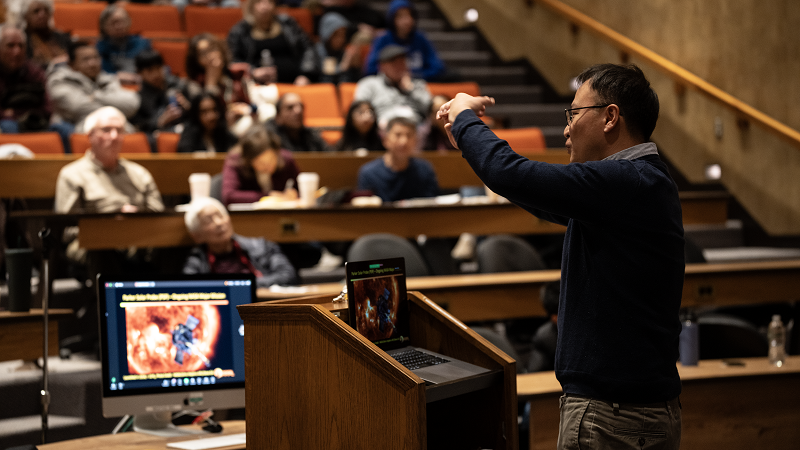Science on Saturday is Underway at Princeton Plasma Physics Lab
SATURDAY SCIENCE: Jongsoo Yoo, a principal research physicist and deputy head of discovery plasma science at the Princeton Plasma Physics Laboratory (PPPL), focuses on solar flares in the first in a series of seven Science on Saturday lectures featuring a slate of distinguished speakers on a range of topics of current interest. (Photo by Elle Starkman/PPPL Communications Department)
By Donald Gilpin
Solar flares, quantum computing, microplastic pollution, direct recycling, schizophrenia, the science of polling, and more. Science fans of all ages are gathering on Saturday mornings over the next two months to participate in the 41st year of the Princeton Plasma Physics Laboratory’s (PPPL) Science on Saturday Lecture Series.
Funded by the U.S. Department of Energy’s Fusion Energy Sciences program, this year’s Science on Saturday series launched on January 18 with a presentation by Jongsoo Yoo, principal research physicist and deputy head of discovery plasma science at PPPL, who focused on the surface of the sun, magnetic reconnection, and the mysterious process behind solar flares.
An enthusiastic crowd of more than 200 — about two-thirds in person, one-third online — attended the event, which ran from 9:30 to 11 a.m. at the Melvin B. Gottlieb Auditorium in PPPL’s Lyman Spitzer Building at 100 Stellarator Road.
Some families have been attending long enough to include three generations of fans.
“It’s like a family reunion every year, and we love watching the little ones grow up and bring their own families,” said PPPL Science Education Senior Program Manager Deedee Ortiz, who organizes the series.
A show of hands from the audience revealed that many of the audience members were there for the first time, but there were many more who had been coming for five, 10, 20, and even 40 years.
“We love offering Science on Saturday,” said PPPL Head of Public Engagement and Workforce Development Andrew Zwicker, who hosts the program. “Each year we have an amazing lineup of scientists, and it’s always a pleasure seeing our regulars and new audience members.”
Zwicker described the opening lecture as “an enormous success,” with so many in attendance that the PPPL ran out of doughnuts, bagels, and cream cheese. “We’ll be ordering even more for next Saturday,” he added.
Every year the PPPL tries to bring in topics that are of current interest. “We try to get topics that are both scientifically interesting and also on people’s minds,” he said. “They want to learn more about things we all talk about at the dinner table.”
In commenting on this Saturday’s upcoming session on polling, Zwicker said, “We’ve all been focused on what various polls said and whether they are right or wrong. Monmouth University Professor Patrick Murray leads one of the highest quality national polls, and he’s going to talk about both the science of polling and the art of polling.”
“And on the following Saturday, February 1, “we are going to learn about microplastics,” Zwicker noted. “People are learning that these tiny particles of plastic are everywhere and they are showing up in our brains and our bodies, and fish are consuming them. Plastic pollution is an enormous problem and we’re going to hear from a young inventor [Yidian Liu of PolyGone Systems] who has come up with a system to take microplastics out of our waterways. She’ll describe that to us.”
Featuring distinguished world class speakers on timely, cutting-edge topics, the following Saturdays sessions will include Corey Toler-Franklin of Columbia University on “Quantum-level Spectral Analysis and Deep Learning for Life Science and Biomedical Research,” on February 8; Chao Yan of Princeton NuEnergy and Princeton University on “Eco-friendly and Energy-efficient: The Role of Direct Recycling in Promoting Sustainability,” on February 15; Andrew Houck of the Princeton Center for Theoretical Science on “Will Quantum Computers Solve the World’s Greatest Problems?” on March 1; and Bonnie Firestein of Rutgers University on “Schizophrenia — A Journey Beyond the Brain,” on March 8.
Known as the Ronald E. Hatcher Science on Saturday Lecture Series the program honors the PPPL engineer who hosted the series for many years and died suddenly in 2014.
Zwicker emphasized the importance of science literacy in the 21st century and the value of this popular Science on Saturday series. “Science literacy is always important no matter the year,” he said. “We live in such a technology-driven world, and understanding the world around us is so important for helping us make decisions in our daily personal lives — the food we eat, the medicine we take as we age, as we care for parents or grandparents, as we make sure that our young people are getting the education they need and that they’re prepared for a world where tech drives so many different things. Understanding that world and its impact on our lives is more important today than it has ever been.”
He continued, “That is why in the end we do these lectures. Before each lecture starts I ask three questions of our speakers, which includes what are their hobbies, so that people can see that scientists and engineers have a personal side as well. The goal is to break down any barriers, not just between scientists and the general public, but between science and the general public — to put a human face on all that.”
Science on Saturday visitors can arrive at PPPL beginning at 8:30 for coffee, bagels, and doughnuts. Visit pppl.gov/events/science-saturday for more information.


